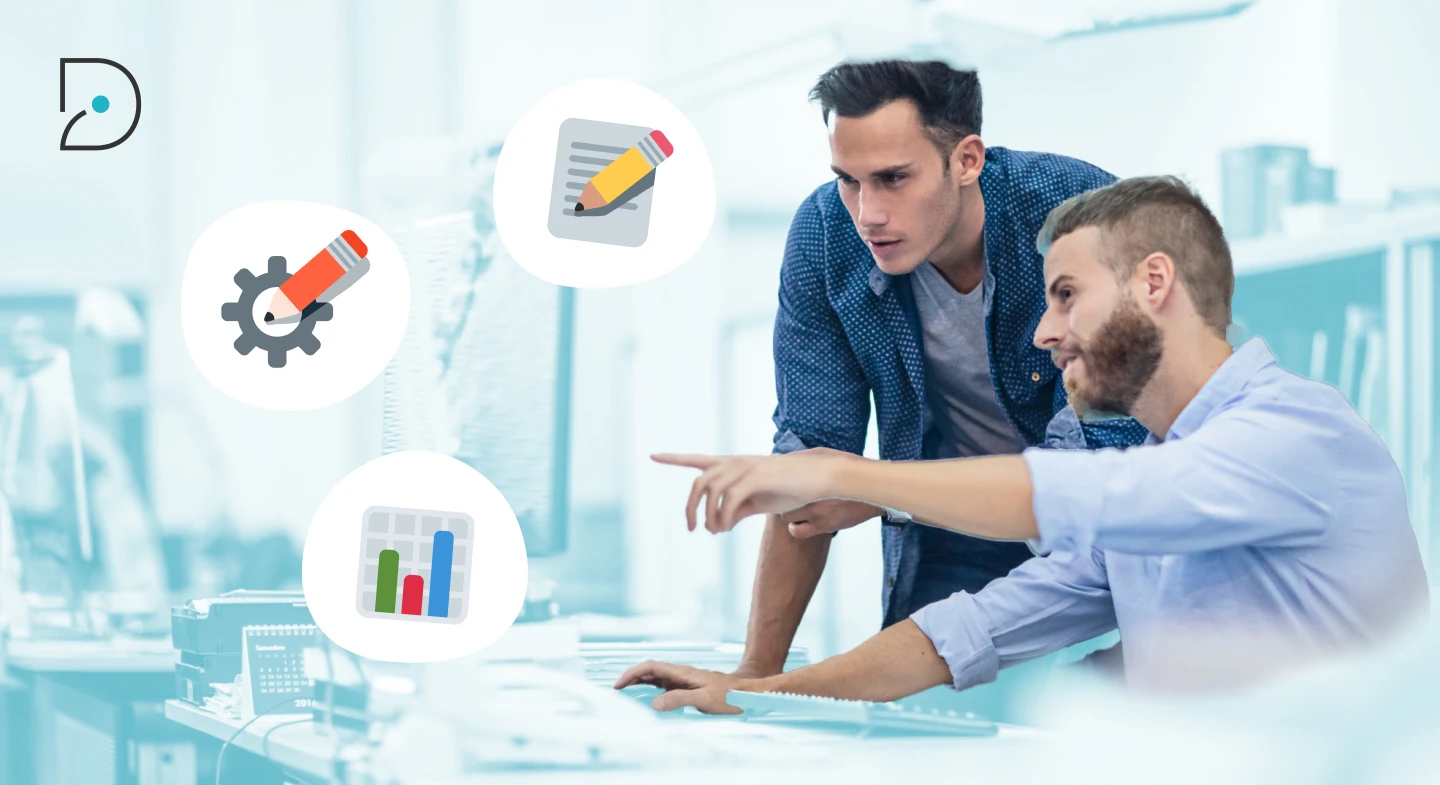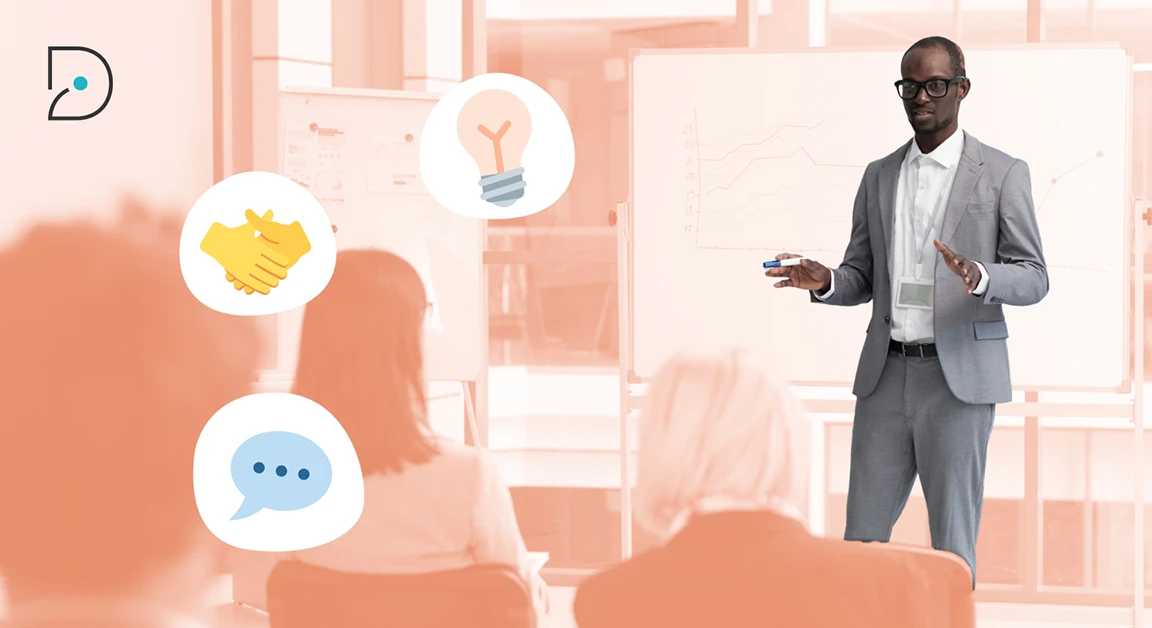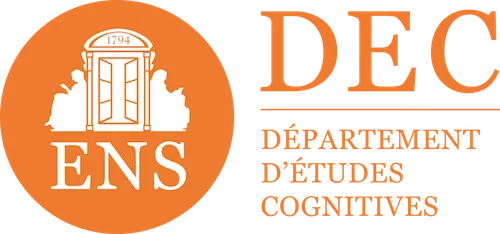

Soft skills training: developing essential skills
Technical skills are no longer enough to ensure the success and sustainability of a business. Today, soft skills, these behavioral and relational skills, are becoming the real drivers of performance. At Didask, we are committed to supporting you in this transformation by offering you tailor-made soft skills training.
What are soft skills?
Soft skills include all the human qualities that promote collaboration and efficiency within the company. Unlike technical skills, they are linked to how an individual interacts with others. They are also about the ability to adapt to change and solve problems. These skills include:
- Communication
- Emotional intelligence
- Critical thinking...
By developing these skills, your teams will not only be more efficient, but also more fulfilled on a daily basis.
What are the 4 categories of soft skills?
They fall into four main categories.
- The first relates to communication, which is necessary to share ideas clearly and to listen actively to others.
- The second category includes self-management, which includes the ability to manage stress, organize, and maintain a positive attitude.
- The third category is collaboration, which includes team spirit and the ability to cooperate with a variety of profiles.
- The fourth category involves critical thinking and creativity, which are needed to solve problems and find innovative solutions.
What is the difference between soft skills and hard skills?
Hard skills correspond to technical skills, specific to a position or profession. They are based on measurable and validated knowledge, such as software proficiency, accounting or programming.
Conversely, soft skills combine human and behavioral qualities, such as communication, adaptability or critical thinking. These skills are more difficult to quantify because they relate to how an individual interacts with their environment.
Together, these two types of skills form a complementary duo. Hard skills make it possible to do, while soft skills facilitate the way of doing and collaborating.
What is the purpose of soft skills training?
Better employability
A study published on PubMed and covering thousands of job offers in a 5.0 context, reveals a strong demand for:
- Critical thinking
- Problem solving
- Communication skills
- Creativity.
Training your employees in soft skills meets these expectations and improves their employability. These courses help them adapt to market changes and collaborate more harmoniously. It is an asset to remain competitive and strengthen the commitment of talent within your company.
Transferable skills
They are particularly useful because they transfer from one context to another. UNESCO indicates that these are personal qualities “that can be used in many types of jobs”. In other words, skills such as communication or empathy are valuable in all sectors. They apply in sales as well as in project management or customer support.
This transferability means that the training benefits the company in the long term. Even if an employee changes position or department, his behavioral skills remain relevant and beneficial to the organization.
Soft Skills training: the lever for employee engagement
Training is not limited to the acquisition of skills, it also reinforces the commitment and motivation of your teams. By developing skills such as active listening, collaboration or managing emotions, your employees gain confidence. This makes them feel better equipped to take on daily challenges. This trust and recognition of their talents create a more harmonious work environment.
For your business, this means better talent retention and a positive corporate culture.
Soft Skills training: our e-learning catalog
To develop behavioral skills, we offer the Didask training catalog dedicated to soft skills. These interactive modules are designed for immediate implementation in business. You can easily integrate them into your environment thanks to our partners.
What does soft skills training include?
Effective training combines several pedagogical modalities. Ours offers interactive e-learning modules, with videos, quizzes and practical cases. It also includes concrete scenarios and regular feedback to anchor learning. For example, your employees practice negotiating with a virtual customer or actively listening to a colleague.
In addition, the Author tool and Adaptive Learning by Didask automatically adapts the difficulty and the content according to each profile. These elements ensure training that covers both theory and practice, while adapting to individual needs.
Soft skills training: the skills to focus on
In a training course, certain skills must be at the heart of the program:
- Communication : learn to express yourself clearly (oral and written), to listen actively and to adapt your message to your interlocutors.
- Leadership : develop the ability to guide, inspire and unite a team, even without direct hierarchical authority.
- Time Management : acquire techniques to organize tasks, set priorities and respect deadlines.
- Critical thinking and problem solving : knowing how to analyze situations, identify challenges and find innovative and relevant solutions.
- Team work : collaborate, share information and value the complementarities of members.
- Emotional intelligence : strengthen empathy, self-control and stress management.
- Creativity and adaptability : encourage open-mindedness, innovation and the ability to reinvent oneself in the face of change.
- Negotiation and influence : knowing how to defend your point of view, find compromises and convince without formal authority.
- Public speaking : gain confidence to present your ideas in front of a group.
What are the benefits of soft skills training?
Integrating soft skills into your training program has many advantages for your employees and your organization. These skills improve collaboration, interpersonal communication, and the agility of your team.
They also promote commitment, innovation and stress management, all qualities sought after in a demanding work environment.
The Didask solution focuses on active pedagogy, which places the learner at the center of action. Thanks to personalized courses and concrete situations, each individual progresses at their own pace and strengthens their confidence.
Businesses find it a way to optimize collective performance and build a culture of innovation and resilience. It is an opportunity for sustainable and measurable transformation. This directly benefits your projects and your entire organization.
How to train in soft skills?
Soft skills are acquired through practice
Beyond theory, these skills are rooted above all through practical application. Only by experimenting, repeating, and applying these skills in real life situations can you master them.
This is why effective training includes numerous practical exercises:
- Simulated interviews
- Feedback sessions
- Creativity exercises, etc.
These immersive activities require the learner to implement the skill (active listening, leadership, etc.) rather than passively memorizing it. In the long run, repetition in different contexts reinforces the person's automation and behavioral agility.
Soft skills are acquired at the right time
The timing of learning also matters. Soft skills are often better assimilated when they are taught in connection with the concrete and current needs of the learner.
For example, immediate communication training will be all the more effective if it comes just before an important presentation.
Current educational tools make it possible to adapt training at the most appropriate time for everyone. Didask's Adaptive Learning technology, for example, adjusts content in real time according to the level, pace, and context of the learner. This ensures that each participant receives the right module at the “right time” during their journey.
Train in soft skills with an educational expert
The support of an experienced trainer is a real lever for optimizing the impact of your soft skills training courses. This professional can assess the specific needs of your teams and design programs that incorporate adapted modalities. It focuses on the effectiveness of scenarios, the agility of formats and educational innovation to capture the attention of learners.
At Didask, we combine the strengths of our AI assistant And of the Instructional AI with the human expertise of our advisers. This complementarity guarantees content adapted to each individual, in a collaborative and stimulating environment. Training with an expert also means optimizing learning.
Developing soft skills means acquiring professional skills that reinforce the adaptability and assertiveness of employees. The objective? Bring value to each person and facilitate collaboration. These skills are necessary to evolve in an increasingly digital professional environment. At Didask, our LMS tool complements this logic of personalized support. Moreover, it remains consistent with your training center or your intra-company strategy.
Make an appointment directly with our eLearning experts for a demo or simply more information.













